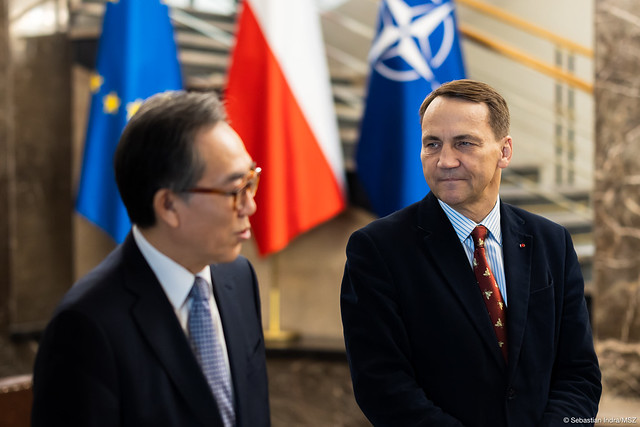 Polish and South Korean Foreign Ministers, Radosław Sikorski and Cho Tae-yeol, meet in Warsaw to discuss economic and defense cooperation.
Polish and South Korean Foreign Ministers, Radosław Sikorski and Cho Tae-yeol, meet in Warsaw to discuss economic and defense cooperation.
Nuclear Proliferation Amidst Diminishing U.S. Security Guarantees
The United States is currently taking a far more confrontational approach to foreign policy than during most previous administrations, acting conciliatory to Russia and threatening to abandon its previous defense commitments in Europe. With tensions and mistrust between the United States and other NATO members at an all-time high, leaders across the world are scrambling to develop security strategies that do not depend on the United States, including at the nuclear level.
The United States has historically led the world against nuclear proliferation. The 1994 Budapest Memorandum saw Ukraine surrender its nuclear weapons to Russia in exchange for security guarantees that the United States, United Kingdom, and Russia would not invade. Russia broke that agreement in 2014 with the annexation of Crimea, claiming that the Maidan Revolution created a new government in Ukraine separate from the one that signed that 1994 agreement. Since 2014, the United States has provided Ukraine with nearly $70 billion worth of military support, but President Trump and Republican policymakers have openly expressed their desire to curb military support for Ukraine as the war enters its third year. Now, Europe is considering shifting its nuclear deterrence strategy to be sustainable without the United States.
The United States is not violating the Budapest Memorandum if it does not continue to provide military support to Ukraine. However, there is a good chance that no country will ever exchange nuclear deterrence for security guarantees ever again. The Trump administration’s current approach to this conflict also hurts the potential for any future non-proliferation treaties with nuclear-threshold states like Iran. Global nuclear security sentiments are splitting into two categories: those who wish to explore contingency options outside the American nuclear umbrella, and those who are considering becoming nuclear powers themselves.
There are currently nine countries that possess nuclear weapons, but that does not tell the whole story. Beyond those nine countries, there are also several nuclear-threshold states, which are countries that have the facilities to develop a nuclear weapon, but have not yet done so. Some of those countries include Japan, South Korea, Germany, the Netherlands, Brazil, Canada, and Iran. As the United States distances itself from its prior security agreements, like those made with Ukraine and NATO, nuclear-threshold states in precarious geopolitical situations, such as Iran, South Korea, and now possibly NATO members, should be considering alternative nuclear security strategies in light of an increasingly unreliable American nuclear security umbrella.
As the United States adjusts its security guarantees, European countries are searching for alternative nuclear umbrellas to get under. In particular, France has taken charge of diversifying the European nuclear security umbrella. Europe is primarily protected by American contributions to the NATO nuclear sharing system; however, French President Emmanuel Macron, admits that they “have to be ready” for a time when the United States is not by their side. Germany has repeatedly expressed its desire to remain a non-nuclear state, but Chancellor-elect Friedrich Merz has admitted that there must be a conversation about European nuclear sharing without the United States. Though a French proposal to host nukes in Germany has been on the table for years, Poland and France have been more seriously discussing the potential of nuclear weapons hosting. A recent poll now shows that confidence in the United States to defend a NATO ally from a Russian invasion has fallen below 50 percent amongst NATO members’ citizens.
While some seek a new umbrella to stand under, others in more vulnerable situations, such as South Korea, are exploring taking matters into their own hands. For months, South Koreans have been discussing nuclear weapons development, recently claiming they supported an independent nuclear arsenal. This came alongside polls indicating that less than half of South Koreans believe the United States would defend them in the event of an attack, a number that has undoubtedly not improved with this shift in American foreign policy. Now, the possibility of developing its own nuclear weapons to deter North Korea is “not off the table,” per South Korean foreign minister Cho Tae-yul.
To reverse this effect of nuclear realignment that the current defense policy has created, the United States needs to course-correct from this era of hostility towards its allies. That effort should start in Europe, where Washington needs to invoke a revitalized sense of stable and reliable security that helps keep European countries aligned with overall American interests. Nuclear proliferation, whether allied or adversarial, is a slippery slope. When one country develops a nuclear weapon, its neighbors grow fearful and look to develop their own—an effect that has been multiplied with allied mistrust in American defense.
Image Credit: “Minister Radosław Sikorski spotkał się z Ministrem spraw zagranicznych Republiki Korei Cho Tae-yul“. Ministry of Foreign Affairs of the Republic of Poland. CC BY-NC 2.0.






